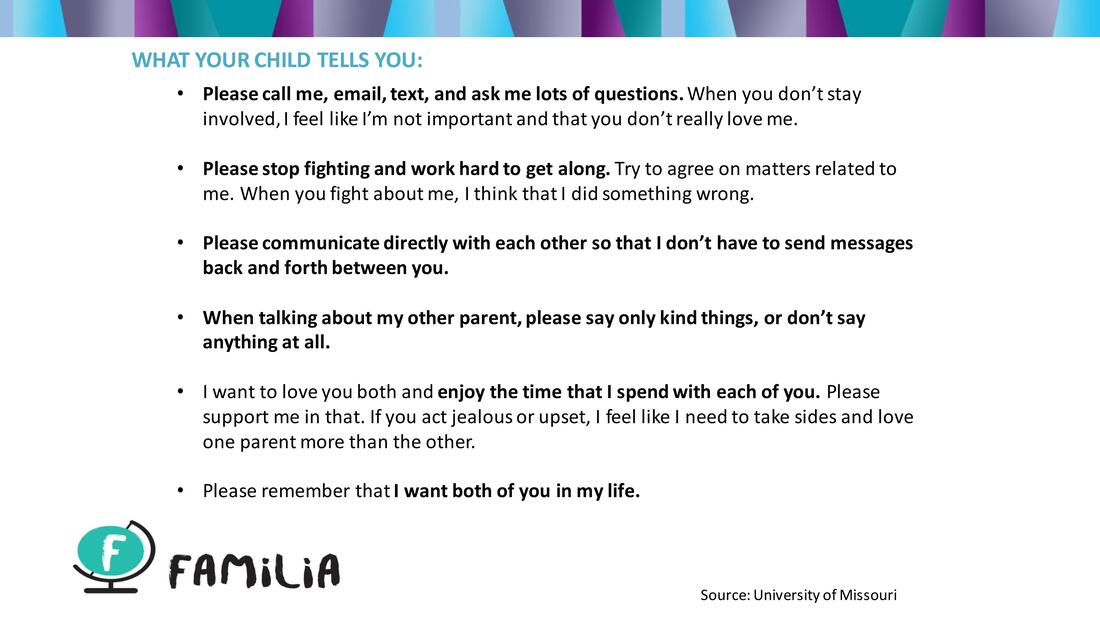"We sat down as a family and discussed it. The children were upset, but we made it clear it was not their fault." "The two older ones who were in their later teens said that we should have done it long before. They could see that neither was happy in the relationship and we argued a lot." Divorce or separation changes children's lives permanently and shakes their feelings of security. For children divorce can be an especially stressful and confusing time, and it can be traumatic at any age. Shock, anger, guilt, sadness are all common feelings among children in divorced families. You can dramatically reduce your children’s pain by making their well-being your top priority.
Your patience, love and listening skills can minimize anxiety as your children learn to cope with the new circumstances. By keeping routines and agreeing to them together with your ex, you remind them that they can count on you for stability, structure, and care. By maintaining a working relationship with your ex is proved to help children the most to lessen the anguish and stress that comes with watching parents in conflict. With your support your child can emerge feeling loved, confident, and strong—and even with a closer bond to both parents. |
QUICK LINKS
|
self-reflection and Homework
One of the best ways you can help your child to adjust, is to go through your divorce and emotions thoroughly yourself. When you have done your part in self-reflection, dealt with the changing emotions, discussed with your ex-spouse and come at peace with the divorce, you are better equipped to have a divorce without resentment and bitterness that affect your child.
The identity of a child is formed with the knowledge that his/her Mom and Dad are nice people and that he/she was born because they loved each other. Talk kindly to your child about your ex, former relatives and the culture and habits they represent - they all affect his/her identity and feeling of self-worth. When you feel ready for it, you can find pictures of your former family and ex-spouse for your child to put out in his/her room.
Have enough time to spend in peace with each of your child to go through their emotions. With small children you can ask them to draw a picture of a divorce and discuss about the picture. With older children you can start conversations by asking for example how their life has changed and why they think people get married and divorced. Ask regularly how they are. If you don't live with your child, communicate actively with texts, emails and phone calls.
Talk positively about your child having two homes - it can actually be special and especially cool if there're two rooms to make your own. If there's no space for your child to have his/her own room, find some space that your child feels is just his/her own - this makes your child feel welcome and thought of in your home. Try to get all the most important toys and necessities for both homes so your child feels safe and comfortable in both.
The identity of a child is formed with the knowledge that his/her Mom and Dad are nice people and that he/she was born because they loved each other. Talk kindly to your child about your ex, former relatives and the culture and habits they represent - they all affect his/her identity and feeling of self-worth. When you feel ready for it, you can find pictures of your former family and ex-spouse for your child to put out in his/her room.
Have enough time to spend in peace with each of your child to go through their emotions. With small children you can ask them to draw a picture of a divorce and discuss about the picture. With older children you can start conversations by asking for example how their life has changed and why they think people get married and divorced. Ask regularly how they are. If you don't live with your child, communicate actively with texts, emails and phone calls.
Talk positively about your child having two homes - it can actually be special and especially cool if there're two rooms to make your own. If there's no space for your child to have his/her own room, find some space that your child feels is just his/her own - this makes your child feel welcome and thought of in your home. Try to get all the most important toys and necessities for both homes so your child feels safe and comfortable in both.



